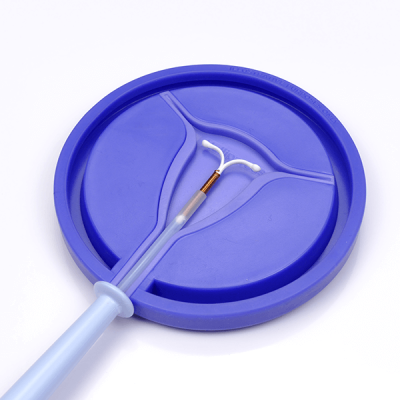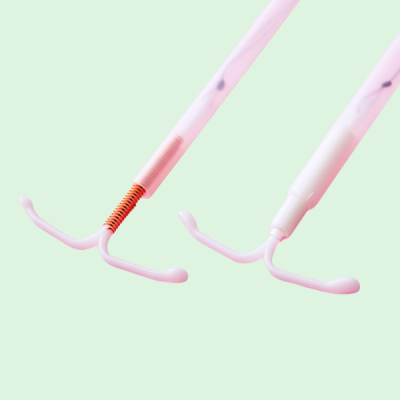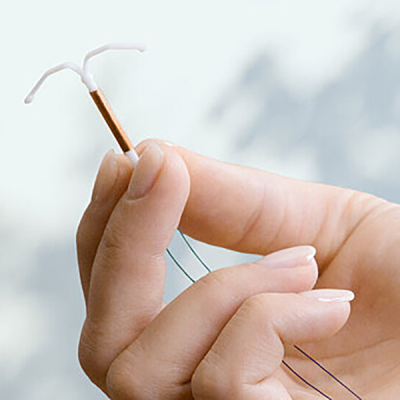
What is an IUD (contraceptive coil)?
The coil is often known as an intrauterine device or IUD, or sometimes it’s called an intrauterine system, IUS.
It’s a small T-shaped device that doctors insert into the uterus (womb), where it stays for several years. It’s a popular contraceptive choice for women because it is effective and hassle-free.
If you’ve struggled to remember to take the combined or mini pill, a coil can be a great alternative.
Copper contraceptive coils can also be a good option for women who wish to avoid hormonal forms of contraception entirely.
Copper coil vs hormonal coil Which is right for you?

Preparing for your coil fitting
If you want a coil fitted, please book an initial appointment to discuss your needs before the fitting.
On the day of the coil fitting, it is essential to ensure that there is no risk of pregnancy. You may need to use additional contraception such as the pill, using a condom, or abstaining from sex, since the first day of your last period.
It’s a good idea to take a simple painkiller such as paracetamol or ibuprofen about an hour before the coiled fitting. And do remember to eat breakfast or lunch, whichever is before your coiled fitting. Don’t risk feeling unwell or faint.
On the day of the coil fitting, we’ll talk through the procedure so that you’re happy to go ahead, and we’ll go through a consent form. You’ll then need to remove your underwear from the waist down, lie down on a couch, and a drape will cover you. I’ll have a clinical colleague with me to assist during the procedure.
When you’re ready, a lubricated speculum is inserted into the vagina (which is a bit like having a smear test) so that the cervix can be seen. Next, a little local anaesthetic is sprayed onto the cervix, which numbs the cervix. It takes about 3 minutes to take effect. A clip is gently attached to the cervix to hold it, and a small plastic wand is inserted with care through the cervix to measure the depth of the womb. This ensures the coil goes into exactly the right place in the womb.
The want is removed and a very thin, hollow tube (like a straw) is gently inserted through the cervix and then the coil is passed through it. The ‘arms’ of the coil cleverly unfold inside the womb, which prevent the coil from falling out once it’s in place. There are some threads attached to the coil which hang just outside of the cervix, and these are trimmed to a short length.
The threads are used to locate the coil when it eventually needs removing. You’ll be taught how to feel the threads are still there, so you can check on them once a month and be confident that your coil is still in the right place.
If you’re sexually active, you should avoid unprotected sex for 7 days before your appointment to reduce the risk of infection. During our initial appointment prior to the coil fitting, it may occasionally be necessary to take some swabs to exclude infections or STDs, before we fit the coil.
What’s it like to have a coil fitted?
Many women may feel a little anxious before their coil fitting, but it’s a straightforward, and very tolerable procedure. During the fitting, you may feel some discomfort or cramping, like period pain. The whole procedure usually lasts only a few minutes.
After the coil fitting, it’s normal to experience some light spotting and cramps, which will nearly always subside within a day or two.
You may be wondering whether you or your partner might find the presence of the coil to be uncomfortable during intercourse. Most people never notice the coil, but if for any reason the threads might be irritating you or your partner, they can be trimmed further.
Coils are great at ‘staying put’. There is a very minimal risk—less than 1 in 1000—of the coil shifting or perforating the uterus. Should any uncertainty arise about the coil’s location, an ultrasound can confirm it’s in position.
Remember, neither type of coil protects against STIs. If you have a new partner or multiple partners, using condoms is still advised.


Private Coil Fitting in Essex
If you want to discuss a coil fitting, please book a consultation. We’ll review your medical history, discuss your options, and check if a coil is suitable for you.
We’ll then set up the coil fitting, which takes around 20-30 minutes. Some women will return to work after their coil fitting, but it’s a good idea to take the rest of the day off, in case you’re experiencing some mild cramps.
Copper coils will give you immediate contraceptive cover after you fit them. Hormonal coils (Mirena, Kyleena and Jaydess) start to give contraceptive cover from 7 days, so you’ll need to use a different form of contraception or abstain from intercourse for 7 days after the fitting.
Finally, we’ll have a check-up at 6 weeks to make sure that all is well and that we can see the threads are in place. We include this as part of your coil fitting service.

